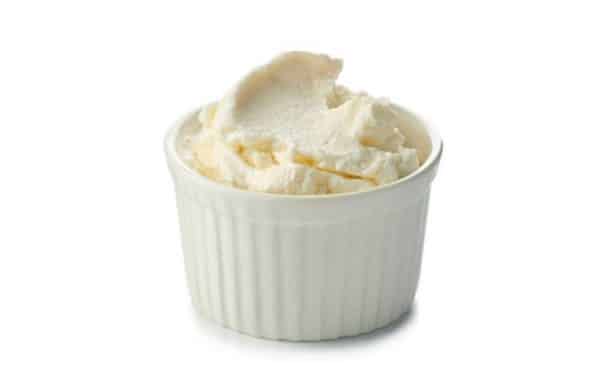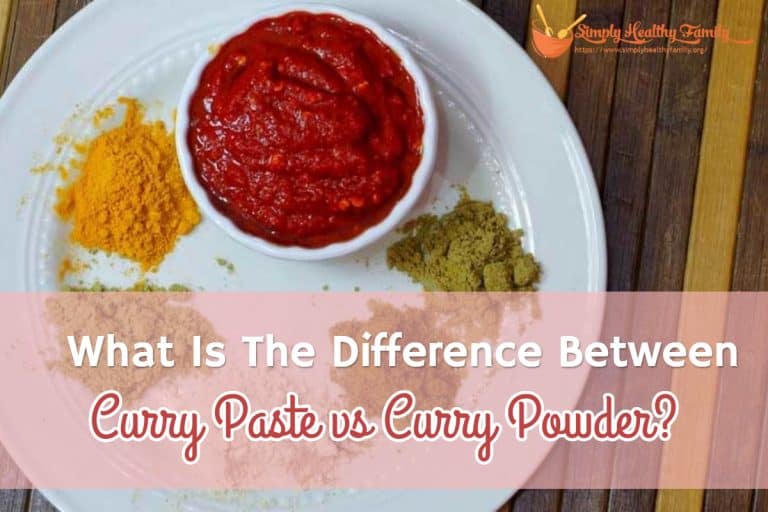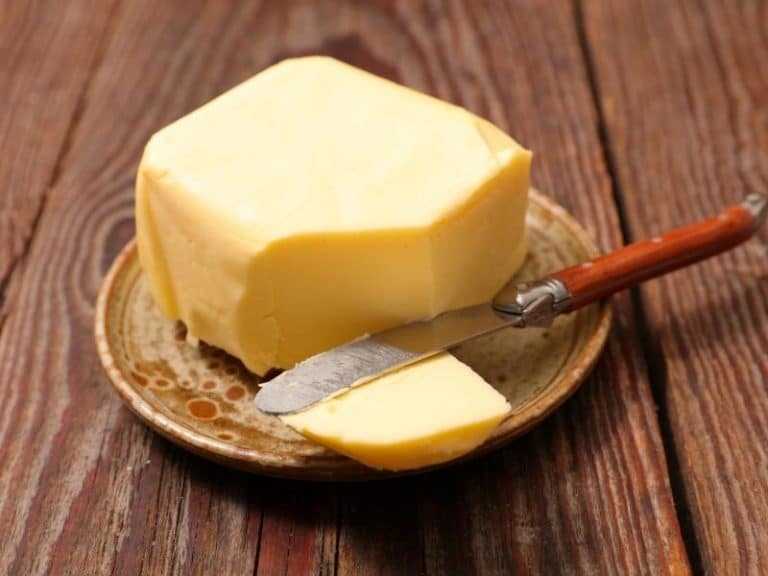Do Potatoes Go Bad: How Long Do Potatoes Last?
Do Potatoes Go Bad? Yes, potatoes go bad because exposure to light, air, and humidity causes potatoes to deteriorate and eventually rot.
Storing potatoes correctly prevents rapid deterioration, but even the best attempts to store potatoes cannot preserve these veggies indefinitely.
Raw potatoes last from one week to three months, depending on how the potatoes are stored, while cooked potatoes last for up to four days.
How Long Do Raw Potatoes Last?
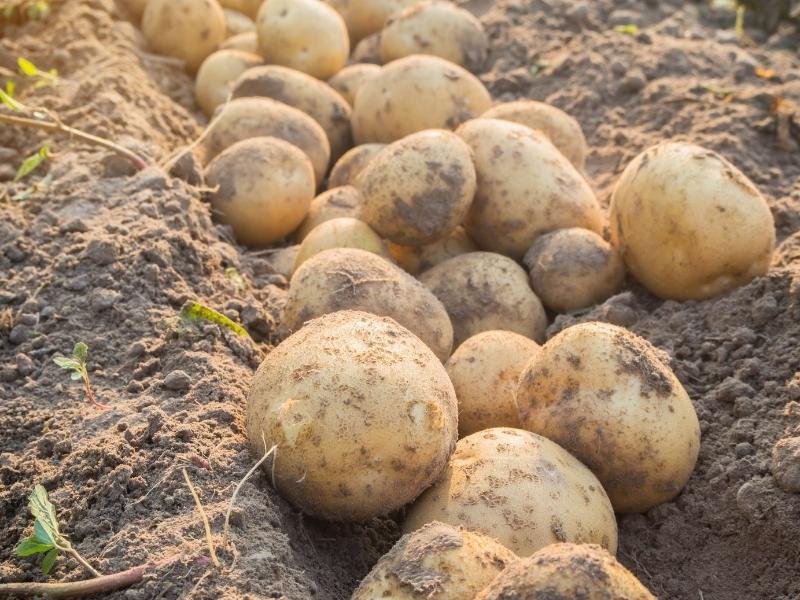
Raw potatoes last for about one week when stored in a basket on the kitchen counter, but can last for two to three months when stored correctly.
Potatoes that are exposed to light and air deteriorate quickly because gasses in the atmosphere and natural light react with certain chemical components in potatoes and make the potatoes sprout.
Fresh potatoes have little indentations, known as eyes, on their skin. These eyes are harmless in fresh potatoes but after a few days, the potatoes begin to sprout from the eyes.
Sprouted potatoes aren’t dangerous when the sprouts are new and small. Simply remove the sprouts and use the potatoes as usual. However, sprouted potatoes that are left to stand eventually start sprouting on the inside as well, making the potatoes inedible.
Glycoalkaloid toxins like solanine can develop in uncooked potatoes exposed to light, making the potatoes unsafe to eat. Solanine poisoning — a type of food poisoning — causes many potentially dangerous symptoms, such as nausea, vomiting, stomach cramps, and diarrhea.
Humidity in the atmosphere causes potatoes to spoil quickly. Exposure to moisture results in soft, moldy potatoes. Eating moldy potatoes can result in food poisoning.
A cool, dry, dark place like an aerated kitchen cabinet, pantry, or cellar is the ideal environment for storing potatoes. Place raw potatoes in an open cardboard box, an uncovered bowl, an open basket, or a mesh bag, so that cool air can circulate around the potatoes.
Storing uncooked potatoes in a sealed container or sealed bag causes the potatoes to retain their natural moisture, which makes the potatoes go bad sooner.
Don’t wash raw potatoes before storing them. The potatoes absorb extra moisture during the washing process, resulting in soft potatoes. Only wash the potatoes immediately before using them.
Avoid storing raw potatoes in the fridge or freezer because the temperature in the fridge is too low and turns the potatoes brown and soft. The natural water in frozen potatoes forms ice crystals, resulting in bad potatoes.
Red Potatoes
Red potatoes have a higher natural sugar content than average potatoes. The sugar in red potatoes interacts with chemicals in the atmosphere, causing red potatoes to spoil more quickly than other fresh potatoes.
Prolong the shelf life of red potatoes by storing them in a cool, dark, dry place.
Russet Potatoes
Russet potatoes have the same shelf life as other popular white potatoes. Russet potatoes will last longer when stored in a cool, dark, dry place — and not out in the open.
Cooked Potatoes Shelf Life

Cooked potatoes last up to four days in the fridge. After storing in the fridge and before eating, reheat cooked potatoes to a temperature of at least 165°F to kill any bacteria.
Bacteria multiply quickly in cooked potatoes at room temperature, causing the potatoes to spoil after two to three hours.
Adding certain ingredients to cooked potatoes can lengthen or shorten the potatoes’ lifespan. For example, pouring a vinaigrette dressing on potato salad prolongs the fridge life of cooked potatoes to up to six days because the vinegar in the dressing acts as a natural preservative.
Adding butter, cream, or milk to mashed potatoes makes the mashed potatoes spoil sooner because dairy products have a limited fridge life. The same rule applies to potatoes that have been cooked in a cheese sauce.
Storing cooked potatoes that have been added to meat or fish dishes limits the potatoes’ fridge life to two to three days. Potatoes that have been cooked in a meat gravy deteriorate after two to three days in the fridge.
How to Tell if Potatoes Are Bad
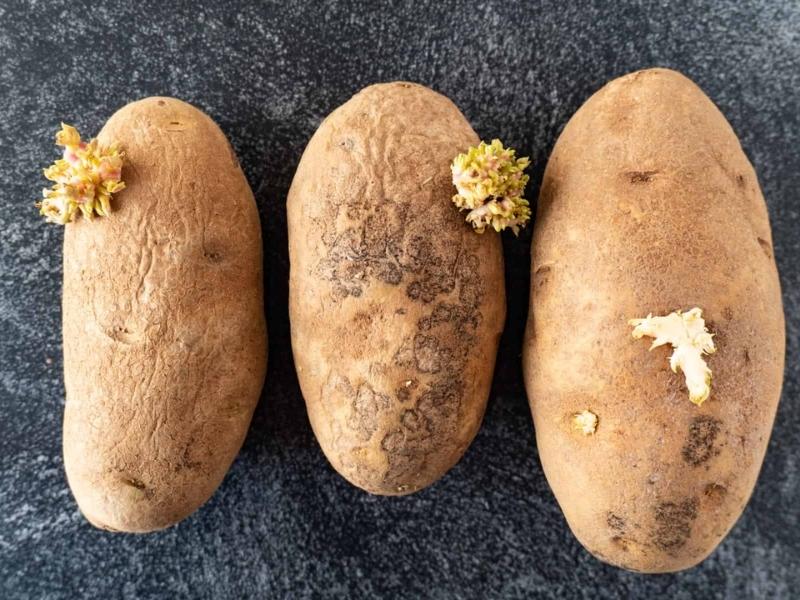
There are different ways to tell if raw and cooked potatoes have gone bad. Eating bad potatoes can cause mild to severe food poisoning, with symptoms like stomach cramps, nausea, vomiting, and diarrhea.
Signs of Spoiled Raw Potatoes
These are the most common ways to tell if raw potatoes have gone bad:
- Dark patches or green spots on the skin
- Soft to the touch
- A musty smell
- Multiple, long sprouts
- Shriveled or wrinkled skin
How to Tell if Cooked Potatoes Are Bad
These are the signs that cooked potatoes have gone bad:
- Green spots or patches of mold
- A yellowish or greenish tinge to the color
- A sour or unpleasant odor
- A slimy film on the surface
- A bitter, unpleasant taste
Best Way to Store Potatoes
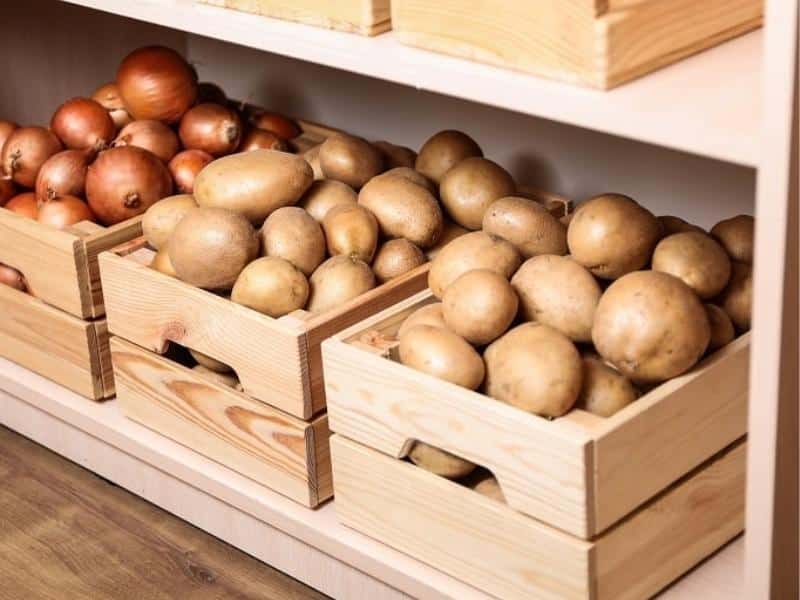
The best way to store raw potatoes is to wipe off any visible dirt with a clean, dry kitchen towel and place the potatoes in an open container or cardboard box in a cool, dark, dry place. Don’t put the potatoes in a sealed bag or sealed container.
Peeled raw potatoes can be stored in the fridge for later use — whole, sliced, or cut into chunks. Place the peeled raw potatoes in a bowl and cover them with clean, cold water. Cover the bowl with an airtight lid or cling wrap. Store in the fridge and use within two days.
The best way to store cooked potatoes, mashed potatoes, and sweet potatoes is in an airtight, sealed container in the fridge. Place cooked potatoes in the fridge within three hours.
Avoid storing cooked potatoes in the same container as other foods because other foods can transfer bacteria, causing the potatoes to spoil sooner.

